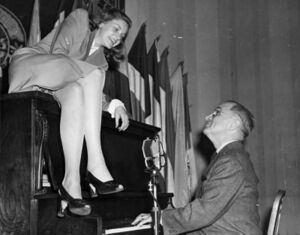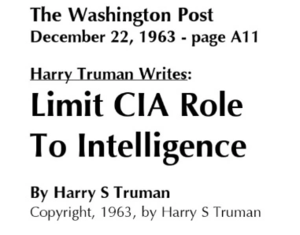Document:Reflection on the Role of the U.S. Vice Presidency
| On 12 April 1945, Vice President Truman was preparing to have a drink in House Speaker Sam Rayburn’s office when he received an urgent message to go immediately to the White House, where Eleanor Roosevelt told him that her husband had died after a massive cerebral hemorrhage. Suddenly, the ‘piano player’ was responsible for overseeing the final phase of World War II and shaping the postwar global order: Truman Doctrine, Marshall Plan, NATO, and the UN. |
Subjects: John Nance Garner, CIA, Harry S. Truman, Lyndon B. Johnson, Gerald Ford, George H.W. Bush, Kamala Harris
Source: Intel Today (Link)
★ Start a Discussion about this document
Reflection on the Role of the U.S. Vice Presidency
- “The Vice Presidency is not worth a bucket of warm piss.”
Winter is coming soon, and I have decided to embark on a fun project: writing a short book on the early days of the CIA. President Harry S. Truman created the agency in 1947 to help the US better understand and respond to two major emerging threats: communism and the nuclear age.
- “There is something about the way the CIA has been functioning that is casting a shadow over our historic position and I feel that we need to correct it.”
- Harry Truman
- (22 December 1963)[2]
Today, I’d like to share with my readers a short comment that will only appear as a footnote in my book: the surprising, and often undervalued, importance of the vice presidency.
There’s a famous photo of Harry Truman and actress Lauren Bacall at the National Press Club in Washington, taken on 10 February 1945. It shows [https://en.wikipedia.org/wiki/Lauren_Bacall Ms. Bacall perched atop a piano being played by Vice President Harry S. Truman.
Rest assured that Truman is playing the piano, not Ms. Bacall! Nevertheless, the scene was considered somewhat risqué at the time. How times have changed!
The point I want to make is that this photo may have been the high point of Truman’s vice presidency.
Astonishingly, Truman wasn’t even aware that his country was working on the Manhattan Project — the massive undertaking to build the world’s first nuclear bomb. Stalin, on the other hand, knew all about it! So much for hyper-secrecy…
John Nance Garner, who served as Vice President under Franklin D. Roosevelt from 1933 to 1941, seemed spot on when he stated ‘poetically’ that the vice presidency was a worthless position.
And yet, history proves otherwise. In the short period I cover in my book (1947–1974), three Vice Presidents became President overnight.
On 12 April 1945, Truman was preparing to have a drink in House Speaker Sam Rayburn’s office when he received an urgent message to go immediately to the White House, where Eleanor Roosevelt told him that her husband had died after a massive cerebral hemorrhage. Truman asked her if there was anything he could do for her? She replied:
- “Is there anything we can do for you? For you are the one in trouble now!”
Suddenly, the ‘piano player’ was responsible for overseeing the final phase of World War II and shaping the postwar global order: Truman Doctrine, Marshall Plan, NATO, and the UN. And let us never forget that Truman authorised the use of atomic bombs on Japan — a weapon he had known nothing about just weeks before.
Lyndon B. Johnson became President after the assassination of John F. Kennedy on 22 November 1963. Johnson inherited the escalating conflict in Vietnam, which deeply divided the country and ultimately damaged his legacy, leading him to decide not to run for re-election in 1968. By then, over 500,000 US troops were in Vietnam, and the conflict had become a full-scale war with heavy casualties on both sides.
Gerald Ford was appointed Vice President in December 1973, after Spiro Agnew resigned due to charges of corruption. Richard Nixon, embroiled in the Watergate scandal (involving several individuals with CIA backgrounds), faced likely impeachment and removal from office. He resigned on 9 August 1974. Ford, who had never been elected to either the presidency or vice presidency, became the only person to serve as President without being elected to the office.
Just beyond the scope of my book, Gerald Ford appointed George H.W. Bush as Director of the CIA in 1976. Bush later became Vice President under Ronald Reagan, and then President himself in 1989.
Though the vice presidency was traditionally seen as largely ceremonial, these transitions demonstrated how crucial the role could be in moments of national crisis. Garner’s remark grossly underestimated the true potential of the office, especially when a Vice President had to step into the presidency unexpectedly due to the death or resignation of the sitting President.
This underscores why selecting a vice presidential candidate must be taken seriously for they must be ready to assume the highest office at a moment’s notice.
In each case, the Vice President was thrust into one of the most powerful roles in the world, illustrating how consequential the office can become in the right (or wrong) circumstances. My American friends may want to reflect on that…
Did you know? On 22 December 1963, Truman admitted in writing that he was seriously “disturbed by the way CIA has been diverted from its original assignment.”
- “I think it has become necessary to take another look at the purpose and operations of our Central Intelligence Agency. At least, I would like to submit here the original reason why I thought it necessary to organise this Agency during my Administration, what I expected it to do and how it was to operate as an arm of the President. (…)
- We have grown up as a nation, respected for our free institutions and for our ability to maintain a free and open society. There is something about the way the CIA has been functioning that is casting a shadow over our historic position and I feel that we need to correct it.”
The day after the mysterious death of UN Secretary-General Dag Hammarskjöld on 18 September 1961, President Truman told a group of reporters:
- “Hammarskjöld was at the point of getting something done when they killed him. Notice that I said ‘when they killed him.’”
As psychiatrists like to ask: “Who is ‘they’?”

